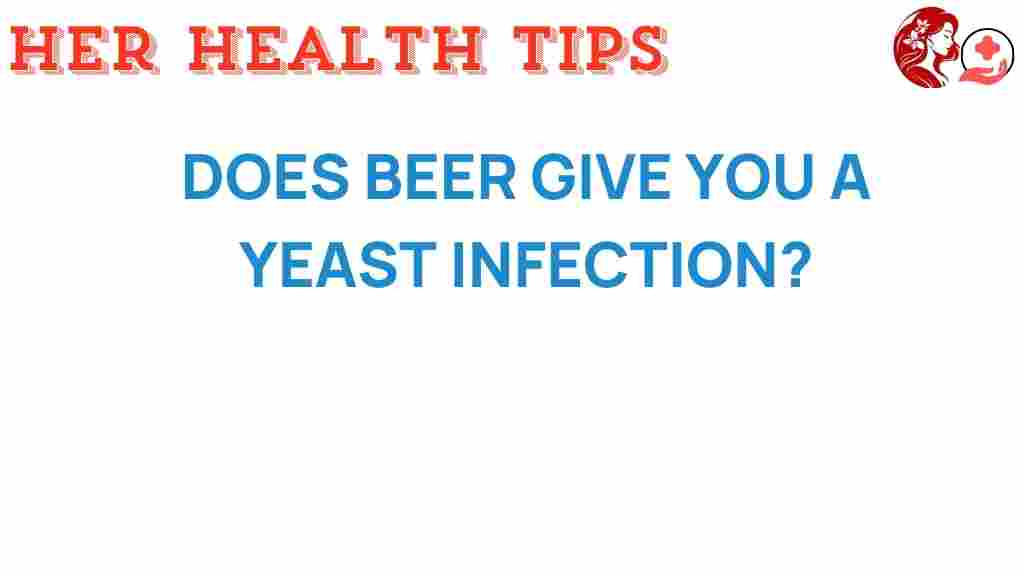Unraveling the Truth: Does Beer Really Cause Yeast Infections?
When it comes to women’s health, few topics evoke as much discussion as yeast infections. These common conditions are often misunderstood, leading to various health myths. One such myth suggests that drinking beer can trigger yeast infections. But is there any truth to this claim? In this article, we will explore the relationship between beer, yeast infections, and the broader implications for health and wellness. We will also delve into the science of fermentation, the microbiome, and the role of Candida. By the end, you will have a clearer understanding of how alcohol, particularly beer, affects your body and your health.
The Basics of Yeast Infections
Before we delve into the specifics of beer and yeast infections, it’s essential to understand what a yeast infection is. A yeast infection, clinically known as candidiasis, is caused by an overgrowth of the fungus Candida, which is normally present in small amounts in the body. Factors that can lead to an overgrowth of Candida include:
- Antibiotic use
- Hormonal changes
- Weakened immune system
- High sugar diets
- Poor hygiene
Common symptoms of a yeast infection include:
- Itching and irritation in the vaginal area
- Thick, white discharge resembling cottage cheese
- Burning sensation during urination or intercourse
Beer and Its Fermentation Process
Beer is a fermented beverage made from four primary ingredients: water, malted grains, hops, and yeast. The fermentation process involves yeast converting sugars into alcohol and carbon dioxide. This process is similar to how yeast contributes to the growth of Candida in the body. But does this mean that consuming beer can lead to an overgrowth of yeast?
Exploring the Connection: Beer, Alcohol, and Yeast Infections
Alcohol affects the body in various ways, and understanding these effects is crucial when discussing yeast infections. Here are some points to consider:
- Immune System Suppression: Regular alcohol consumption can suppress the immune system, making it harder for the body to control yeast levels.
- Gut Health: Alcohol can disrupt the balance of the microbiome, potentially leading to an overgrowth of Candida.
- High Sugar Content: Many beers contain sugars that can feed yeast, promoting its growth.
While moderate beer consumption may not directly cause yeast infections, excessive drinking can contribute to the conditions that allow Candida to flourish.
Health Myths Surrounding Beer and Yeast Infections
Several health myths persist regarding beer and yeast infections. Here are a few:
- Myth 1: Beer is the sole cause of yeast infections.
- Myth 2: All types of alcohol lead to yeast infections.
- Myth 3: You cannot drink alcohol if you have a yeast infection.
Understanding these myths is vital for women’s health and making informed decisions about alcohol consumption.
Step-by-Step: How to Prevent Yeast Infections
Preventing yeast infections involves a combination of lifestyle changes and awareness of your body. Here’s a step-by-step guide:
- Maintain Good Hygiene: Keep the genital area clean and dry. Avoid douching or using scented products.
- Wear Breathable Fabrics: Choose cotton underwear and avoid tight-fitting clothing.
- Monitor Your Diet: Limit sugar and refined carbohydrates, which can promote yeast growth.
- Limit Alcohol Consumption: If prone to yeast infections, consider reducing your beer intake.
- Stay Hydrated: Drinking plenty of water helps flush out toxins and maintain a healthy balance in your microbiome.
- Consult Healthcare Providers: If you frequently suffer from yeast infections, speak with a healthcare professional for personalized advice.
Troubleshooting: What to Do If You Suspect a Yeast Infection
If you suspect you have a yeast infection, it’s essential to address it promptly. Here are some troubleshooting tips:
- Recognize Symptoms: Be aware of the common symptoms mentioned earlier.
- Over-the-Counter Treatments: Many antifungal treatments are available at pharmacies.
- Consult a Doctor: If symptoms persist or worsen, seek medical advice.
- Keep Track of Triggers: Note any dietary or lifestyle changes that may correlate with infections.
For further reading on women’s health and yeast infections, check out this comprehensive guide.
The Role of the Microbiome in Women’s Health
The human microbiome, particularly in the vaginal area, plays a crucial role in maintaining health. A balanced microbiome can prevent the overgrowth of pathogens like Candida. Here are some key points regarding the microbiome:
- Probiotics: Incorporating probiotics into your diet can promote a healthy microbiome.
- Fermented Foods: Foods like yogurt, kefir, and sauerkraut can help maintain gut health.
- Antibiotic Awareness: Use antibiotics only when necessary, as they can disrupt your microbiome balance.
Conclusion: The Bottom Line on Beer and Yeast Infections
In conclusion, while beer and alcohol can influence yeast infections indirectly, they are not the sole cause. A variety of factors contribute to the development of candidiasis, including diet, hygiene, and the overall health of your microbiome. Understanding the effects of alcohol on women’s health is essential for making informed decisions regarding consumption.
To support your wellness journey, focus on maintaining a balanced diet, practicing good hygiene, and staying aware of your body’s signals. If you have concerns about yeast infections or alcohol consumption, don’t hesitate to reach out to a healthcare professional for guidance. Remember, knowledge is power, and understanding the connection between beer and yeast infections is crucial for your health.
For more information about wellness and yeast infections, visit this resource page.
This article is in the category Conditions and created by HerHealthTips Team
